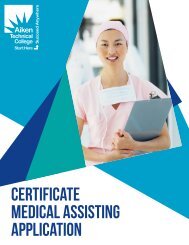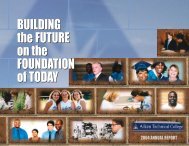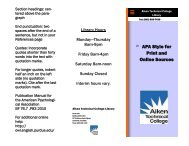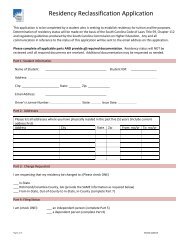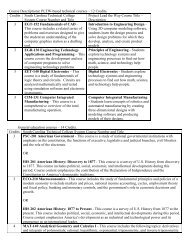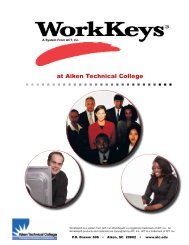2009 Accountability Report - Aiken Technical College
2009 Accountability Report - Aiken Technical College
2009 Accountability Report - Aiken Technical College
Create successful ePaper yourself
Turn your PDF publications into a flip-book with our unique Google optimized e-Paper software.
14<br />
III.1.2 How do senior leaders create a sustainable organization with a focus on action to accomplish the<br />
organization’s mission, strategic objectives, improve performance, and attain your vision<br />
The planning and assessment processes drive the <strong>College</strong>’s actions toward the fulfillment of its mission,<br />
strategic plan and vision. Measurement of various performance criteria drives areas of focus for improvement<br />
and action, which are then addressed in the annual planning processes. Additionally, new initiatives addressed<br />
in the annual plan are a result of routine environmental scanning and assessment results. As described earlier,<br />
annual plans are developed with stakeholder and faculty/staff input and tied to individual performance<br />
evaluations. Divisional teams develop annual plans specific to <strong>College</strong> functions, such as Student Services or<br />
Education and Training. Formally trained project teams are used to plan and execute complex annual plan<br />
items. <strong>College</strong> developed, state mandated and nationally normed surveys, as well as assessment data, are<br />
routinely used to identify gaps in performance and to plan corrective action. Faculty/staff and stakeholder input<br />
and the use of cross functional project teams leads to innovation in addressing opportunities and challenges and<br />
organizational agility. Cross training in key areas results in improved approaches to systems and processes.<br />
Recent reorganizations in the Student Services and Education and Training Divisions originated from employee<br />
and stakeholder input resulting in improved management systems and communication with employees, students<br />
and customers.<br />
III.1.3.How do senior leaders personally promote and support an organizational environment that fosters<br />
and requires: legal and ethical behavior; and, fiscal, legal, and regulatory accountability How are those<br />
monitored<br />
<strong>College</strong> and State policies and procedures provide guidance on appropriate behavior and accountability<br />
standards. Key policies are reviewed with newly hired employees, including policies addressing harassment,<br />
drug and alcohol abuse, and confidentiality of student and employee records (including any medical<br />
information). Periodic in-service training occurs on these topics for existing employees. An attorney review is<br />
performed when new procedures are drafted for implementation to assure legal and ethical standards are<br />
appropriately reflected in polices and documents. Annual fiscal audits are conducted for both the <strong>College</strong>’s and<br />
the Foundation’s fiscal assets with both entities consistently receiving “unqualified opinions” of financial<br />
performances. An internal audit/risk management system is in place and routinely used. Well established<br />
procedures are used to respond to employee and student complaints, including claims of harassment. Legal<br />
counsel is sought in personnel matters to assure consistent and appropriate actions are taken. Refer to II.5 and<br />
III.I.8 for additional information.<br />
III.1.4.How do senior leaders create an environment for organizational and workforce learning<br />
The <strong>College</strong>’s Professional Development Committee identifies desired college-wide learning opportunities<br />
through employee surveys and assists in planning development and training events. Recent learning events<br />
included sessions on generational poverty and its implications for student success, diversity training, and antiharassment<br />
training. The Curriculum and Instruction Committee assists in identifying broad faculty<br />
development needs related to program improvements. The Committee and Education and Training leadership<br />
plans appropriate events on campus. Recent on-campus events for faculty included classroom management, the



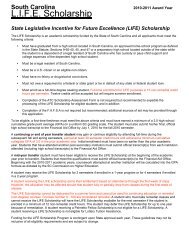
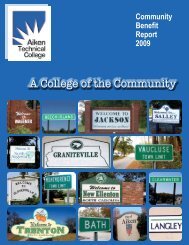
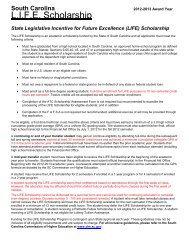
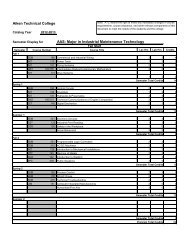

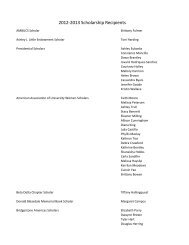
![MLA PowerPoint presentation [PDF] - Aiken Technical College](https://img.yumpu.com/36398339/1/190x143/mla-powerpoint-presentation-pdf-aiken-technical-college.jpg?quality=85)
